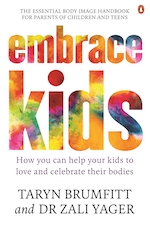If your child asks you if they are fat or tells you that someone called them fat, try to resist the urge to say “You’re not fat! You’re beautiful.” This actually reinforces some of the power of the word.
The aim is to keep your response as neutral as possible. Here’s how you could respond—either at the time or (if you freeze and regret) in a quiet chat afterwards.
- Don’t freak out. Be curious about what they have heard, and the context they have heard it in.
- Empathise with them. You might talk about a time that you were called “fat” as an insult at school or at home, and how it made you feel.
- Explain that some people use the word “fat” to make people feel bad about themselves, and it’s not okay. In our family, we believe that all bodies are good bodies, and we know that all people have fat on their bodies, and it’s really necessary for their body to work properly.
- Emphasise the fact that it’s quite a serious problem if people are teasing each other about the fat on their bodies. Just as we wouldn’t tease someone who has a disability, or whose skin is a different colour, we shouldn’t tease people about their size and shape.
- Tell them that there is nothing wrong with their body, that you love them just as they are.
- Brainstorm some of the things that their body can do that they are proud of.
- Think of some of the kind things they can say to themselves to make them feel better. Empower them with things they can tell themselves and others if this happens again.
Your worth has nothing to do with your weight. All bodies are good bodies. Everyone is worthy of respect and love regardless of how they look.
Psychologist Collett Smart offers more tips for having a conversation about body image with your children in the video below.
What if your child calls another person “fat”?
There are many different options to respond to this, depending on the kid and the context. The aim is to try to reduce the power of “fat”, encourage empathy and normalise the word.
For younger kids:
- Explain that we all have fat: Fat is an important part of our bodies and keeps us healthy. It’s important that we eat some fat as it keeps us full and makes things taste pretty good!
- Neutralise the word: Fat is a describing word. We can use it to describe animals and things.
- Talk about feelings: Calling people “fat” can hurt their feelings. Have you seen anyone calling other people “fat” at school? What could we do to help that person? How we treat each other matters. We need to accept each other and be kind to each other.
For tweens:
You can utilise all of the above strategies for young people, plus:
- Encourage empathy: How would you feel if someone was talking about you like that?
- Talk about stereotypes: By calling someone “fat” are we also making other generalisations about them? You can also talk about these issues generally: Isn’t it interesting that the people who made this show decided to use a person in a larger body to play a character who was lazy and not as smart as the others—is that always true? What effect might this have?
- What’s the why: Ask your child why they think being called fat is a bad thing, and disconnect attributes from appearance. “Someone isn’t mean because they’re fat. They’re mean because they’re not a nice person, and they don’t treat others well.”
For teens, you can add the following:
- Explain the biological necessity of fat: Fat is for insulation, an energy “insurance policy”, and for absorption of vitamins.
- Take a social justice approach: Ask questions about why some people are treated differently because of their appearance, including people in larger bodies. Are any bodies really “good” and “bad”? What discrimination and judgement might people in larger bodies face? Is that really fair? How could we make our home, our school and our world fairer for everyone?
- Ask them: How could we learn more about what life is like for people who are different or who look different to us?
FAQs
Q: My nine-year-old girl came to me asking whether she could “chop off” her belly. What do I say to that?!
It’s inevitable. At some point, your child is highly likely to say that they are fat. This could be just to see how you respond. It could be because they have heard something in the playground. This can happen regardless of the body size and shape they are in.
When our kids say they are fat it can be really triggering for us as parents, depending on what your experiences of childhood and adolescence were. Try to calm yourself . . . the whole idea is to neutralise the word “fat” and take the power out of it rather than convince her that she is not “fat”.
Start by helping her appreciate her body functionality. Talk about the fact that all bodies are good bodies, and we all have fat. Try to talk more about what her body helps her to do, and celebrate the range of bodies that we see out in the world.
Remind her that the body is just the home for her self and her soul. Remind her to be kind to herself in the moments that she has these thoughts about her belly. Lots of people in the world have moments when they wish that parts of their bodies were different, but we need to remember that who we are is more important than what we look like.
Q: My 16-year-old daughter thinks she is ugly and wants cosmetic surgery to “fix” her face. She is watching a lot of things on social media, and I’ve heard her and her friends talk about it. I just want her to be happy. What should I say?
The desire for surgery doesn’t usually come out of nowhere. Research shows that among adolescent and college women, wanting surgery is associated with higher levels of body dissatisfaction, higher body shame, disordered eating behaviours, and body ‘checking’ in mirrors and photos. However, surgery rarely improves satisfaction with appearance when there are underlying body image or mood disorders.
There are a few situations and procedures for which there are benefits (according to the research), including surgery for cleft lip, surgery for prominent ears, breast reduction in cases where breasts are very large and breast augmentation for severe asymmetry. Outside of these situations, it is best to delay and distract adolescents from seeking surgery.
Conversations here might centre around encouraging your daughter to focus on her own unique strengths, rather than comparing her appearance to others. Broadening interests and engagement in activities such as drama, sport and other groups might also facilitate meeting a wider range of peers that could be helpful.
Show her examples of real role models with similar facial features. Encourage her to see and celebrate the diversity of appearance in people all over the world. Find ways for her to soothe and be kind to herself when she finds herself fixating on the parts of her appearance that she is worried about.
If she is very distressed and insistent that surgery is the only option, seeing a psychologist would be helpful to gain strategies in managing anxiety related to appearance, lower expectations of surgery and to rule out body dysmorphic disorder. Good surgeons would refer their patients to see a psychologist anyway, particularly for people under the age of 18.

Edited extract, with permission, from Embrace Kids by Taryn Brumfitt and Dr Zali Yager.
How helpful was this article?
Click on a star to rate it!
0 / 5. 0
Be the first to rate this post!
Taryn Brumfitt and Dr Zali Yager
Related posts
Subscribe
Receive personalised articles from experts and wellness inspiration weekly!


